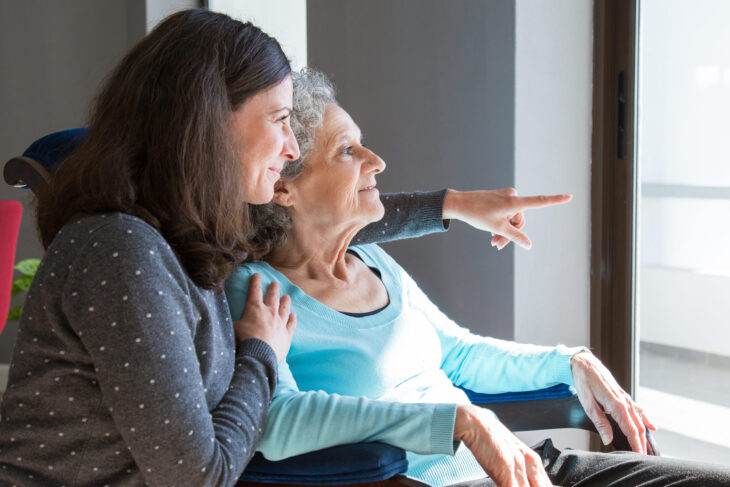Aging is an unavoidable part of life, but that doesn’t make it easy. People are living longer than ever before right now, which is a good thing, but it can also create challenges related to aging and also being a caregiver for loved ones.
For example, it’s not uncommon for people in their 60s to be caring for an aging parent, which is physically and emotionally overwhelming.
According to Caringplaces.com, you may feel so many different things, from guilt if your loved one has to move into assisted living to general sadness.
It’s important that you recognize your emotions are valid when you’re dealing with an aging parent, and you should try to manage them and work through them to the best of your ability.

Source: Franklin Park Senior Living
Combating the Guilt
When you have an aging parent, and you have to make any big decisions regarding their care or their lifestyle, you may feel guilt.
For example, there often is a time where your parent can’t live on their own anymore, and you might realize that, but you still feel guilty about moving them into assisted living.
It may be that your guilt is primarily internal and something you feel yourself, or it could even be that your other family members are making you feel guilty.
For example, you may realize your mother or father will be safer and better cared for in assisted living, but perhaps you have a sibling who disagrees.
No matter the source of your guilt, you need to realize that you’re doing everything you can to take the best possible care of your loved one.
You can’t do everything, and by making the hard decisions, you actually are creating the best situation for your parent.
There are also so many advantages to something like an assisted living residence, such as the opportunity to interact with other people in a safe, secure, and well-managed environment.

Source: Money Crashers
Signs of Caregiver Stress
Whether you’re a full-time caregiver or you’re just caring for your aging parent part of the time, there are a lot of signs of stress you need to watch for in yourself. These can be signs of burnout, and they indicate that you might need to take better care of yourself, including your mental and physical health.
Signs of caregiver stress or mental health concerns include:
- Depression: Specific symptoms of depression can include feeling hopeless, constant guilt, crying, loss of interest, and sadness.
- Withdrawal: You may start to avoid people you care about or activities you once loved.
- Anxiety: It’s very common to feel anxiety when you’re caring for an aging parent in any capacity. You might feel like you can never get everything done, and that can make you feel frustrated and perpetuate the cycle of anxiety.
- Anger: When you’re watching someone age and their health deteriorate, it’s natural to feel anger. Your anger may not even be rational, which is normal. You could be resentful of your spouse because maybe they aren’t in a similar situation to your own or your siblings because perhaps you feel like you’re taking on more of the burden. You might even feel resentful of the parent you’re caring for.
- Problems with concentration: This is a very common symptom of both anxiety and depression. You may always feel like you’re thinking about your parent and the things you need to do so you may find that your work or other areas of your life is suffering as a result.
- Unhealthy coping strategies: You may notice that you’re drinking more than you would normally or spending more time on screens.

Source: CareLink
Coping Strategies
When you’re taking care of an aging parent or watching their health decline, you have to be mindful of your mental health. Don’t feel guilty for prioritizing your well-being because it’s how you’re going to do the best you can for everyone in your life.
There are caregiver resources you can identify first of all.
These resources range from online support groups to financial programs that will help you cover the cost of care.
You will also have to set boundaries not just with your parent but with everyone in your life. It’s okay to say no and to only do things that work for you. You have to think about how you’re using your energy, your time, and your money and be protective of that use.
Accepting your limitations can also work along with this.
Take care of your mental and physical health in the ways that are best for you.
For example, always make time to stay active. When you’re active, even if you’re just taking a short walk each day, it’s going to make you feel better about everything. It will improve your physical health, your immune system, and your mood. You’ll be a better caregiver and a person more equipped to take on other challenges.
When you feel like it, do things you love.
Maybe you watch your favorite show or grab a coffee with a friend.
You don’t always have to be doing for others, no matter the situation with your parent.

Source: Bridges to Recovery
Go To Therapy
Much of what’s talked about above focuses on the caregiving element of having an aging parent, but there’s more emotional complexity beyond that.
You are also watching someone who was probably a source of strength and support for you your entire life change a great deal. This is especially hard with neurodegenerative disorders like Alzheimer’s.
It’s very likely that in addition to everything else, you’re experiencing grief. It can feel like you’ve already lost someone, even if you haven’t.
Take time to go see a therapist on a regular basis and work through your emotions.
Therapy is one of the best ways to share how you’re feeling without worrying about being judged.
Again, when you have a parent who is showing signs of aging, it’s overwhelming and you can feel so many different things at once, but don’t stop prioritizing your own health and well-being.
